By Maria Martinez
WASHINGTON (Reuters) – Politicians within Germany’s three-way coalition government should put their differences aside to address the country’s stagnating growth, the president of the German Savings Banks Association (DSGV) told Reuters in an interview.
The German economy contracted last year and the government foresees it will shrink again this year, while the International Monetary Fund last week also cut its forecasts for the country.
“We are very worried about the economic situation in Germany,” DSGV President Ulrich Reuter said on the sidelines of the International Monetary Fund and World Bank annual meetings on Friday.
“We need to free ourselves from bureaucratic hurdles and find a clear and future-oriented path for more competitiveness,” he said. “That must be our main focus. (Politicians) must leave everything else aside.”
The three parties of the so-called “traffic light” coalition of the centre-left Social Democrats, the Greens and the FDP, which has ruled Europe’s largest economy since 2021, hold diverging views on how to spur growth.
Chancellor Olaf Scholz from the SPD and Economy Minister Robert Habeck from the Greens have already laid out their economic plans.
German Finance Minister Christian Lindner told Reuters in an interview on Friday that he is also working on his own proposals, which will be presented shortly.
“The direction is right with all these proposals,” Reuter said. “You just have to make a package out of it. That’s what the economy will very much wish for: agree and move on.”
Reuter’s association has a business relationship with three out of four companies in Germany, and plays a big role in the financing of the small and mid-sized companies known as Mittelstand that together provide 55% of Germany’s jobs.
Germany is working on structural reforms to stimulate anaemic growth, which Reuter sees as “an important step”, but he called for further reforms ahead of the next election in September 2025.
The economic downturn is taking its toll on the Mittelstand, with companies being very cautious in their demand for credit, holding back innovation and investment, he said.
“The Mittelstand is still the backbone of the German economy, but the pressure is rising.”




































